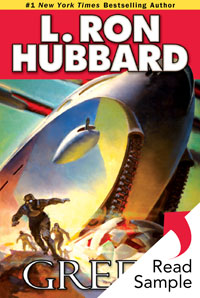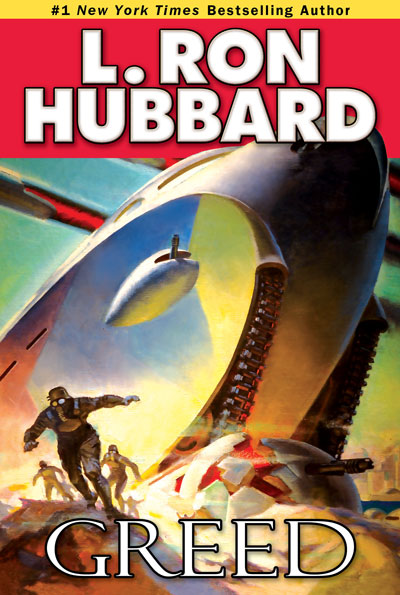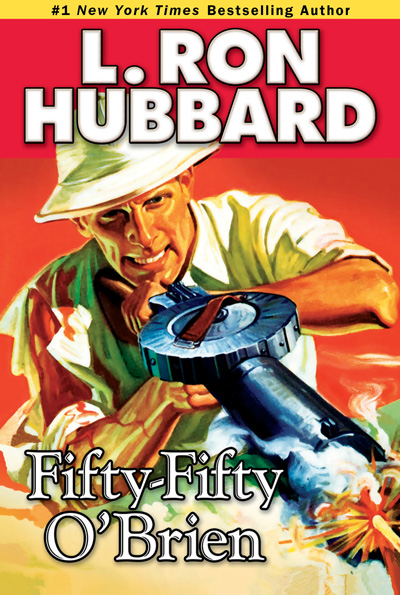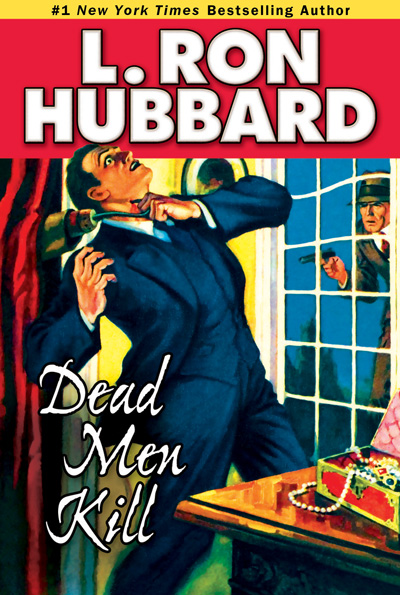Is Greed good? The future of Earth and all of mankind may hang on that one question. And George Marquis Lorrilard—a space-age ace-pilot, adventurer, and fortune-hunter—is just the man to answer it.
The world is divided between Asia and the United Continents—two great superpowers locked in eternal warfare. But the balance of power is about to shift in Asia’s favor. They have developed a top-secret weapon—the cohesion projector—that could lead to annihilation on an unprecedented scale.
But as far as Lorrilard is concerned, the number one problem with the projector is that it stands in the way of his profits. Can he find a way to subvert the powerful weapon and resume his enterprising exploits? For millions of people on Earth survival may ultimately depend on the power of one man’s Greed.
Also includes the science fiction adventures, “The Final Enemy,” in which Earth discovers it faces a distant, yet devastating new foe, the identity of which is the most shocking blow of all; and “The Automagic Horse,” the story of a Hollywood special effects wizard who is about to apply his movie magic to a project that is out of this world.
“A wonderfully rich and textured experience, complete with realistic sound effects and moody atmospheric music.”—Publishers Weekly
* Publishers Weekly Listen Up Award winner for 2008
SAMPLE

ABOUT THE AUTHOR
Greed was the last L. Ron Hubbard story published in Astounding Science Fiction in April 1950, marking the end of an era. Over a decade before, he had been a key figure in the opening of the Golden Age of Science Fiction. Now, as he turned his attention to other writings, the Golden Age drew to a close. But some three decades after this story appeared, Mr. Hubbard would make a triumphant return to the field with the publication of his bestselling novel Battlefield Earth and the extraordinary ten-volume series Mission Earth.
Greed Glossary
Stories from the Golden Age reflect the words and expressions used in the 1930s and 1940s, adding unique flavor and authenticity to the tales. While a character’s speech may often reflect regional origins, it also can convey attitudes common in the day. So that readers can better grasp such cultural and historical terms, uncommon words or expressions of the era, the following glossary has been provided.
ad astra per aspera: (Latin) to the stars through difficulties.
Aida: the name of a popular Italian opera composed by Giuseppe Verdi and one of the most performed operas in North America.
alpha: the first one; the beginning.
Andes: a mountain range that extends the length of the western coast of South America.
arquebuses: heavy portable guns with a trigger mechanism that ignites the powder with a slow-burning fuse. They were invented during the fifteenth century.
astrography: the art of describing or delineating the stars; a description or mapping of the heavens.
batteries: groups of large-caliber weapons used for combined action.
Bell Telephone: the original Bell Telephone Company was founded in 1878 by Alexander Graham Bell’s father-in-law. It later merged with other companies to eventually become what is known today as the American Telephone & Telegraph Company (AT&T).
bit player: an actor having a very small speaking part in a play, motion picture, etc.
Blarney stone: a stone set in the wall below the battlements of the Blarney Castle, a medieval stronghold in Ireland. It is said to bestow the gift of eloquence, the art of using language well and convincingly, to anyone who kisses it.
blockbuster: a high-explosive bomb designed to demolish buildings over a large area.
bolts: short arrows for use with a crossbow.
boomp girls: Hollywood starlets.
buckjumping: moving in sudden jerks; lurching.
bucko officers: officers of a ship who drive their crew by the power of their fists.
bully-boy: fine; excellent or splendid man.
cakewalked: walked with a high prance with a backward tilt.
champ: to make biting or gnashing movements.
cheerio: (chiefly British) usually used as a farewell.
chewed and hewed: pondered and came to an agreement.
chews: pieces of dried tobacco for chewing.
confederated: brought into an alliance.
cuspidor: a large bowl, often of metal, serving as a receptacle for spit, especially from chewing tobacco, in wide use during the nineteenth and early twentieth centuries.
drifting: making a horizontal passageway or tunnel in a rock layer.
ease her: nautical term used to order the steersman to reduce the amount of steerage during a turn. Usually given as an order as the ship approaches the desired course. The term originated during the days of sailing ships and her referred to the rudder.
flips: a class of mixed drinks with egg as a defining feature. The most commonly known flip is eggnog. A basic flip calls for a base spirit, such as brandy or rum, egg, sugar, cream and nutmeg.
furlong: a measure of distance equal to 220 yards.
gamma rays: very penetrating rays emitted by radioactive substances.
Garand rifle: a semiautomatic rifle named after designer John Garand (1888–1974).
geldings: male horses that have been castrated.
Ghost Rider, The: a movie from 1935 about a deputy who cleans up a town with the assistance of a ghost.
G-men: government men; agents of the Federal Bureau of Investigation.
Goldwyn, Samuel: (1879–1974) Hollywood independent motion picture producer who had an instrumental role in the formation of the two largest Hollywood studios, Paramount Pictures and Metro-Goldwyn-Mayer.
high road: the surest or best approach.
Horch phaeton: the make and model of a late 1930s high-performance luxury car manufactured in Germany by the Horch Company. The Horch phaeton was a large open automobile with a folding top, seating five or more passengers. August Horch, one of the pioneering figures of Germany’s automotive industry, established a line of cars that was known for elegance, luxury and superlative standards in automotive construction. Production of Horch automobiles ceased when World War II began.
hostlers: people who are employed to tend horses.
Huguenot: French Christians who broke away from the Catholic Church in the seventeenth century. They wore eccentric, richly colored clothes.
ken: (Scottish) know, have knowledge of.
kingpin: a main or large bolt in a central position.
Lamarr, Hedy: (1913–2000) a famous Austrian-born American actress known primarily for her great beauty.
lookout: a problem or concern.
Lost Tribe, The: a movie produced by Columbia Pictures in 1949 as the second installment of the “Jungle Jim” series, a comic-strip adventure. The hero of the story, Jungle Jim, helps to drive off white men’s efforts to find and take the riches from a tribe hidden in the African wilds.
manganese steel: steel containing manganese (a hard gray metallic element), an alloy invented by Sir Robert Hadfield in 1882, which increases the depth of hardening in the steel, and improves the strength and toughness. This metal can still be shaped when cold without fracture, and once fully hardened, has unusual shock-resistant properties.
Man o’ War: a horse, considered by many to be the greatest US thoroughbred racehorse of all time.
man-o’-war: a warship; combat ship.
meet her: nautical term used to order the steersman to turn in the opposite direction in order to check or stop a ship’s swing. The term originated during the days of sailing ships and her referred to the rudder.
Moloch: a god to whom children were sacrificed. It was depicted as a man with the head of a bull.
Pitts, ZaSu: (1894–1963) a famous American film actress who appeared in hundreds of movies from 1917 until 1963.
plate: in printing or photography, an image or copy.
quirt: a riding whip with a short handle and a braided leather lash.
RCA: Radio Corporation of America; a privately owned radio broadcasting corporation formed in 1919.
rococo: showy.
rooftree: ridgepole; a long beam of wood that runs along the ridge of a roof, and to which the upper ends of the rafters are attached.
Santa Anita: Santa Anita Park; a thoroughbred race track in California known for offering some of the prominent horse racing events in the United States.
Scheherazade: the female narrator of The Arabian Nights, who during one thousand and one adventurous nights saved her life by entertaining her husband, the king, with stories.
scurvy: a disease caused by a deficiency of vitamin C, characterized by bleeding gums and the opening of previously healed wounds.
scut: a worthless contemptible person.
Shantung: a peninsula in east China extending into the Yellow Sea.
skinflint: one who is very reluctant to spend money; a miser.
snagger: a jagged hole, tear or pull.
sorrel: a horse with a reddish-brown coat.
SPCA: Society for the Prevention of Cruelty to Animals.
spur: an angular projection, offshoot or branch extending out beyond or away from a main body.
touts: those who give tips on racehorses, usually with expectation of some personal reward in return.
Westinghouse: George Westinghouse, Jr. (1846–1914), American entrepreneur, engineer and manufacturer who received more than 400 patents for his many inventions including a practical method for transmitting electric power. He founded the Westinghouse Electric Company in 1886.
will-o’-the-wisp: somebody or something that is misleading or elusive.
wrinkle: a clever trick, method or device, especially one that is new and different.












